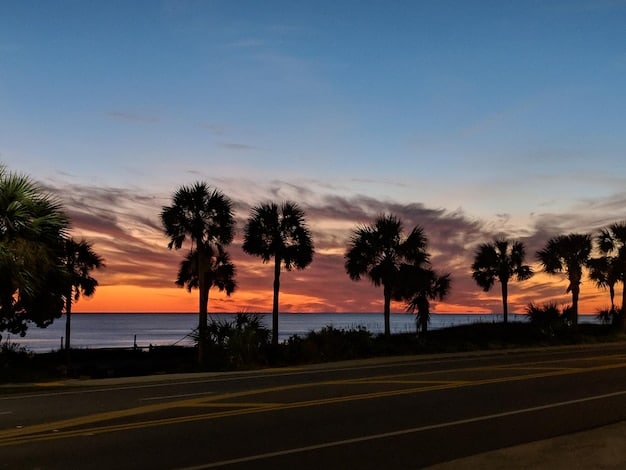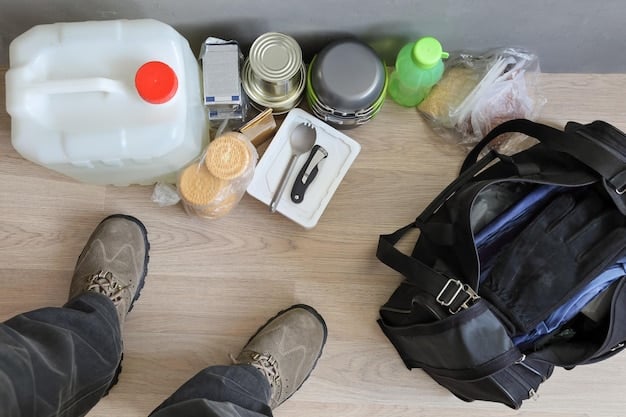2025 Hurricane Season: US Travel Preparedness Guide

The US National Weather Service predicts an above-average hurricane season in 2025, making travel preparedness crucial for those planning trips within the United States. This guide provides essential tips and information to help travelers stay safe and informed during the hurricane season.
Planning a trip within the US in 2025? The **US National Weather Service predicts above-average hurricane season in 2025: Travel Prepared**. It’s crucial to be aware of potential disruptions and take necessary precautions to ensure a safe journey.
Understanding the 2025 Hurricane Season Forecast
The 2025 hurricane season is predicted to be more active than usual, according to the National Weather Service. This means increased risks for travelers in coastal areas. Understanding this forecast is the first step towards effective preparedness.
The National Oceanic and Atmospheric Administration (NOAA) releases its annual hurricane season outlook in May, providing a comprehensive overview of what to expect. This outlook considers various factors, including sea surface temperatures, wind patterns, and atmospheric conditions.
Key Factors Influencing the Forecast
Several key factors contribute to the prediction of an above-average hurricane season. These include:
- Warmer Sea Surface Temperatures: Higher water temperatures fuel hurricanes, providing them with the energy they need to intensify.
- Weaker Wind Shear: Wind shear, which is the change in wind speed and direction with altitude, can disrupt the development of hurricanes. Weaker wind shear allows storms to form more easily.
- Atmospheric Instability: Unstable atmospheric conditions create an environment conducive to the formation of thunderstorms, which can then develop into tropical cyclones.
Staying informed about these factors and the official forecasts will help you make informed decisions about your travel plans. It’s important to regularly check updates from the National Weather Service and other reliable sources.
In summary, the 2025 hurricane season is expected to be more active than usual, making it essential for travelers to stay informed and prepared. Understanding the factors influencing this forecast is crucial for making informed decisions and staying safe during your travels.
Essential Travel Insurance Coverage
Travel insurance is a vital component of hurricane season preparedness. It can protect you from financial losses due to trip cancellations, interruptions, and other unforeseen events. Understanding the different types of coverage available is crucial for selecting the right policy.
Comprehensive travel insurance policies often include coverage for trip cancellation, trip interruption, medical expenses, and lost or delayed baggage. However, it’s important to carefully review the policy to ensure it covers hurricane-related events.

Key Coverage Options
When selecting travel insurance, consider the following coverage options:
- Trip Cancellation: This covers non-refundable expenses if you have to cancel your trip due to a hurricane warning.
- Trip Interruption: This covers expenses if your trip is interrupted due to a hurricane, such as if you need to evacuate or your flight is delayed.
- Medical Coverage: This covers medical expenses if you get injured or become ill during your trip.
It’s also important to understand the policy’s exclusions. Some policies may not cover losses caused by pre-existing conditions or events that were foreseeable at the time of purchase. Always read the fine print and ask questions to ensure you have the coverage you need.
Choosing the right travel insurance policy can provide peace of mind and financial protection during hurricane season. Be sure to research your options and select a policy that meets your specific needs and travel plans.
In conclusion, travel insurance is an essential tool for protecting your investment and ensuring your safety during hurricane season. By understanding the different coverage options and choosing a policy that meets your needs, you can travel with confidence and peace of mind.
Creating a Hurricane Travel Emergency Kit
A hurricane travel emergency kit is a collection of essential items that can help you stay safe and comfortable during and after a hurricane. As the **US National Weather Service predicts above-average hurricane season in 2025: Travel Prepared**, it’s crucial to have this kit ready before your trip.
This kit should include items such as food, water, first aid supplies, communication devices, and personal hygiene products. The specific contents of your kit will depend on your individual needs and the length of your trip.
Essential Items for Your Kit
Here are some essential items to include in your hurricane travel emergency kit:
- Water: At least one gallon of water per person per day for drinking and sanitation.
- Food: Non-perishable food items such as canned goods, energy bars, and dried fruit.
- First Aid Kit: A comprehensive first aid kit with bandages, antiseptic wipes, pain relievers, and any personal medications.
Additionally, consider including items such as a flashlight, battery-powered radio, whistle, dust mask, plastic sheeting, duct tape, moist towelettes, garbage bags, and a wrench or pliers.
By assembling a well-stocked hurricane travel emergency kit, you can enhance your safety and comfort during and after a hurricane. Remember to customize your kit to meet your specific needs and travel plans, ensuring you are well-prepared for any potential challenges.
In summary, creating a hurricane travel emergency kit is a proactive step towards ensuring your safety and well-being during your travels. By including essential items such as water, food, first aid supplies, and communication devices, you can enhance your resilience and ability to cope with unexpected challenges.

Utilizing Weather Apps and Alert Systems
Staying informed about weather conditions is crucial during hurricane season. Utilizing weather apps and alert systems can provide you with real-time updates and warnings, enabling you to take timely precautions. The information from **US National Weather Service predicts above-average hurricane season in 2025: Travel Prepared** will be easily available.
Many weather apps offer features such as radar maps, hourly forecasts, and severe weather alerts. These apps can help you monitor the development of hurricanes and track their movement, allowing you to anticipate potential impacts on your travel plans.
Recommended Weather Apps
Here are some recommended weather apps for staying informed during hurricane season:
- The National Weather Service App: Provides official weather forecasts, warnings, and advisories from the NWS.
- AccuWeather: Offers detailed weather forecasts, radar maps, and severe weather alerts.
- The Weather Channel App: Provides real-time weather updates, video forecasts, and interactive maps.
In addition to weather apps, consider signing up for local emergency alert systems. These systems can send notifications to your phone or email about severe weather events, evacuation orders, and other important information.
By utilizing weather apps and alert systems, you can stay informed about changing weather conditions and take timely precautions to protect your safety and well-being. Remember to regularly check these resources and heed any warnings or advisories issued by authorities.
In conclusion, weather apps and alert systems are valuable tools for staying informed and prepared during hurricane season. By utilizing these resources, you can enhance your situational awareness and make informed decisions to ensure your safety and comfort.
Planning Evacuation Routes and Shelters
In the event of a hurricane, evacuation may be necessary to ensure your safety. Planning evacuation routes and identifying nearby shelters are crucial steps in hurricane preparedness. The knowledge that **US National Weather Service predicts above-average hurricane season in 2025: Travel Prepared** should drive this preparation.
Evacuation routes are designated roadways that lead away from coastal areas and toward safer inland locations. These routes are typically marked with signs and may be subject to traffic controls during evacuations.
Key Steps for Planning Evacuation
Here are some key steps for planning your evacuation:
- Identify Evacuation Routes: Familiarize yourself with the evacuation routes in your area and plan multiple routes in case one becomes blocked.
- Locate Shelters: Identify nearby shelters where you can seek refuge during a hurricane. Contact local emergency management agencies for information on shelter locations.
- Assemble a Go-Bag: Prepare a go-bag with essential items such as water, food, medications, and important documents.
Before you travel, research potential evacuation routes from your hotel or rental property. Also be aware of any pet-friendly shelters in the area, should you need them.
By planning your evacuation routes and identifying nearby shelters, you can increase your chances of a safe and successful evacuation. Remember to heed evacuation orders issued by authorities and follow instructions carefully.
In summary, planning evacuation routes and identifying nearby shelters are essential components of hurricane preparedness. By taking these steps, you can protect your safety and well-being in the event of a hurricane.
Securing Accommodations and Rental Cars
Securing your accommodations and rental cars ahead of time can provide peace of mind and ensure you have a safe place to stay during hurricane season. With the **US National Weather Service predicts above-average hurricane season in 2025: Travel Prepared**, its important to confirm hotel policies.
Many hotels and rental car companies have specific policies regarding hurricanes and other natural disasters. Understanding these policies can help you avoid unexpected costs and ensure you have appropriate accommodations and transportation during your trip.
Important Considerations for Accommodations
When booking accommodations, consider the following:
- Cancellation Policies: Check the hotel’s cancellation policy and ensure it allows for refunds or changes in the event of a hurricane.
- Hurricane Policies: Inquire about the hotel’s hurricane policies, including whether they offer refunds or credits for unused nights if you have to evacuate.
- Location: Choose accommodations that are located inland or in areas less prone to flooding.
For rental cars, confirm that you can return the vehicle to a different location if needed. Also, check if the rental company offers any discounts or waivers related to hurricane evacuations.
By carefully securing your accommodations and rental cars, you can minimize potential disruptions and financial losses during hurricane season. Be sure to read the fine print and ask questions to ensure you understand the policies and procedures.
In conclusion, securing your accommodations and rental cars is an important step in hurricane preparedness. By understanding the policies and procedures of hotels and rental car companies, you can protect your investment and ensure you have appropriate accommodations and transportation during your trip.
| Key Point | Brief Description |
|---|---|
| 🌊 Understanding Forecast | Stay updated on NOAA’s hurricane season outlook. |
| 🛡️ Travel Insurance | Comprehensive coverage is vital for unexpected events. |
| 🎒 Emergency Kit | Gather food, water, first aid, and communication tools. |
| 📍 Evacuation Plan | Know routes and shelter locations in case of an emergency. |
Frequently Asked Questions (FAQ)
▼
An above-average hurricane season suggests a higher likelihood of more named storms, hurricanes, and major hurricanes than the historical average. This implies an increased risk to coastal areas and a need for heightened preparedness.
▼
You should purchase travel insurance as soon as you book your trip. Some policies have waiting periods or may not cover events that are foreseeable at the time of purchase, so early coverage is recommended.
▼
Follow all instructions from local authorities, including evacuation orders. Seek shelter in a safe location, stay informed through weather updates, and communicate with family and friends about your situation.
▼
The most reliable sources for hurricane forecasts are the National Hurricane Center (NHC) and the National Weather Service (NWS). Their websites and apps provide real-time updates and expert analysis.
▼
Traveling to coastal areas during hurricane season can be safe if you are well-prepared and informed. Staying updated with weather forecasts, having travel insurance, and knowing evacuation plans are essential precautions.
Conclusion
As the US National Weather Service predicts above-average hurricane season in 2025: Travel Prepared. Staying informed and taking proactive steps can help you safeguard your travel plans and well-being. By understanding the forecast, securing travel insurance, creating an emergency kit, utilizing weather apps, planning evacuation routes, and securing accommodations, you can navigate the hurricane season with confidence and peace of mind.





